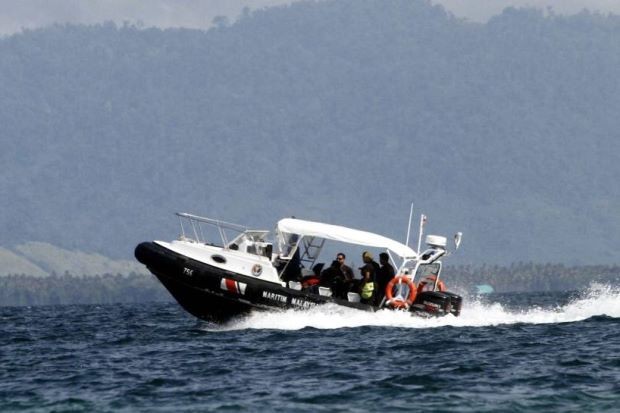Popular Reads
Top Results
Can't find what you're looking for?
View all search resultsPopular Reads
Top Results
Can't find what you're looking for?
View all search resultsRI seeks tighter maritime security after Abu Sayyaf hostages released
The Indonesian government has once again underlined the lack of security and safety in waters shared with Malaysia and the Philippines, after four Indonesian fishermen were rescued over the weekend more than a year after they were abducted in the tri-border area.
Change text size
Gift Premium Articles
to Anyone
T
he government has once again underlined the lack of security and safety in waters shared with Malaysia and the Philippines, after four Indonesian fishermen were rescued over the weekend more than a year after they were abducted in the tri-border area.
The Foreign Ministry confirmed on Monday that a Philippine security operation had succeeded in rescuing a 14-year old Indonesian boy identified only as MK, from the island of Kalupag in Tawi-Tawi province, near the border with Sabah, Malaysia, on Sunday.
The teen was found at the site of a gun battle that broke out on Saturday between the security forces and an Abu Sayyaf splinter group led by Majan Sahidjuan, also known as Apo Mike, who died after sustaining gunshot wounds, according to local media reports.
MK rejoined the three other former hostages from South Sulawesi who were rescued on Thursday last week after an Abu Sayyaf boat capsized en route to Tawi-Tawi due to poor weather at sea.
Abu Sayyaf is an armed group based in the southern Philippines which is notorious for kidnapping people at sea and holding them for ransom. Indonesian citizens have been among the many victims captured by the group in a string of incidents between 2016 and 2020.
The ministry’s director for citizen protection, Judha Nugraha, said it was up to shipowners to follow the rules and avoid fishing in the troubled waters. He also noted Malaysia’s role in guaranteeing secure and safe passage.
Read also: Indonesia calls out Malaysia for ‘ineffective’ security
“The majority of kidnapping cases have occurred in Sabah waters and [the hostages] are brought to the southern Philippines to be held captive,” Judha told The Jakarta Post on Monday.
“Tighter security by Malaysia’s security forces in the Sabah region is the key component to prevent similar incidents from occurring again,” he added.
Repeated abductions have prompted Indonesia, Malaysia and the Philippines to set up a trilateral cooperation initiative that includes coordinated maritime patrols and other cross-border arrangements.
When last year’s incident occurred, Deputy Foreign Minister Mahendra Siregar lambasted the trilateral effort for “ineffective coordination” and expressed his disappointment in the Malaysian authorities.
The Malaysian side had previously called for a review of security patrols in the area.
Some experts have also rallied behind Indonesia’s call for reinforced security in the tri-border area.
Khairul Fahmi, a researcher at the Institute for Security and Strategic Studies (ISSES), said it was important to strengthen regional patrols and that the government had been urged to pressure its Malaysian counterpart to be more serious about securing its borders.
“We can’t say that there isn’t any discussion, but the results have not been significant and a lot of it is still on paper,” he told the Post on Monday.
Khairul also called on Indonesia to review the existing trilateral agreement and look into whether it was on the right track, given that the modus operandi for the repeated incidents were more or less the same.
“As long as the commitment to work together was seen only as a formality, I believe that the threat of another abduction remains,” the military experts said, noting Malaysia’s “passiveness”.
Separately, analyst Beni Sukadis from the Indonesia Institute for Defense and Strategic Studies (LESPERSSI) said the trilateral cooperation was severely lacking in surveillance and early detection technology.
He also said that ASEAN’s Our Eyes initiative, an information-sharing platform initiated by Indonesia in 2018 to counter violent extremism in the region, was not being implemented effectively.
“While surveillance technology has yet to be improved, the regional pact also needs to enhance patrol capabilities,” Beni told the Post on Monday.
Read also: Three Indonesian hostages rescued in Philippines: Police
Due to rampant kidnapping and piracy involving Abu Sayyaf, the Sulu-Sabah-Sulawesi triangle has been dubbed “the new Somalia”. The group has reportedly kidnapped at least 44 Indonesian sailors since 2016.
With the news of Sunday’s rescue operation, all of Abu Sayyaf’s Indonesian hostages have now been liberated, Judha proclaimed on Sunday.










